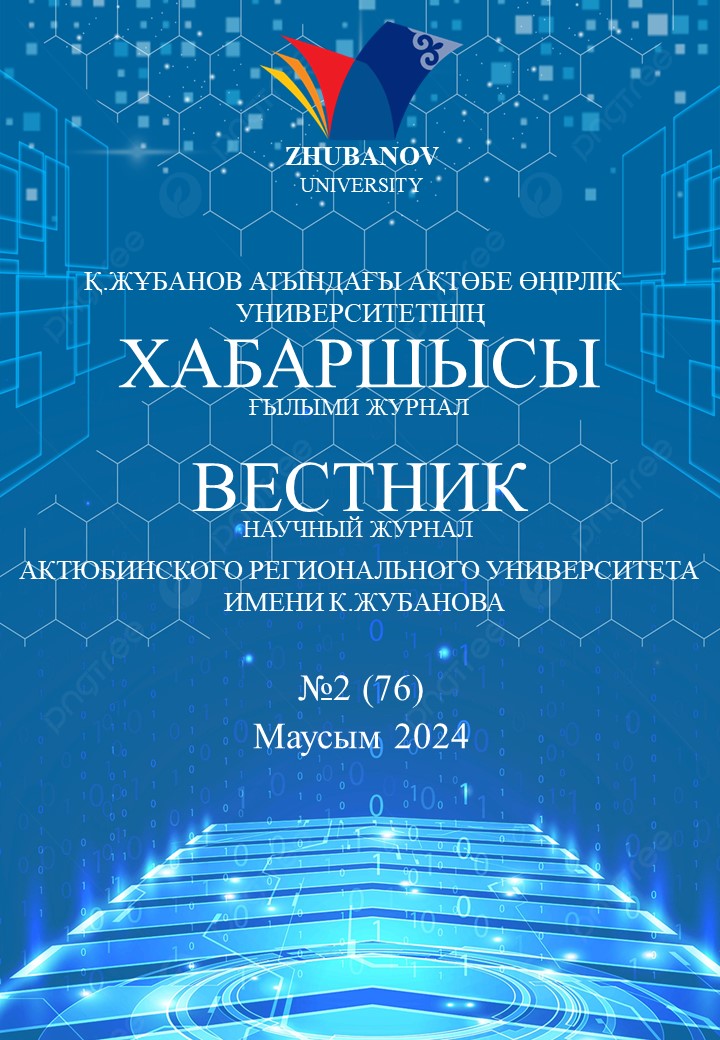This article addresses the challenges of intellectual development among elementary school students
learning English. The authors examine how both objective and subjective aspects of English language resources
influence the intellectual growth of young learners. The study reviews the work of leading educators and psychologists
on the role of cognitive activity based on language structures. Additionally, it attempts to assess the impact of
integrating English into the primary education curriculum in Kazakhstan.
The issue of intellectual development in educational activities has been a persistent concern throughout
various stages of societal development, and schools have consistently worked towards addressing this challenge.
In the article, the authors draw on research by psychological scientists who emphasize that the development
of intelligence represents a qualitative transformation in both the body and psyche. They explore the importance of an
English teacher's professional readiness for fostering the successful intellectual development of young schoolchildren.
Additionally, they highlight that the intellectual development of primary school students in the process of learning
English is enhanced by considering the individual characteristics and creative potential of the children, as well as the
growth of their cognitive motives.
It should be noted that multilingualism is a key strategy in the state educational policy of Kazakhstan. In
this context, teachers' use of various interactive teaching methods in the classroom stimulates younger students to learn
English and increases their motivation to master a foreign language. Teachers aim to integrate diverse teaching methods
and the latest educational technologies to maximize the intellectual development of children. The authors of the article
highlight that intellectual training in English lessons provides primary school students with opportunities for
development, self-assessment, and viewing lessons as a means of both learning and personal and intellectual growth.
N. A. KARGAPOLTSEVA
Биография автора
- Гальскова Н.Д., Никитенко З. Н. Теория и практика обучения иностранным языкам. Начальная школа / Н. Д. Гальскова, З. Н. Никитенко. - М.: Айрис-пресс, 2004. – 247 с.
- Асмолов А. Г. Как проектировать универсальные учебные действия в начальной школе. Пособие для учителя / А.Г. Асмолов. — М.: Просвещение, 2008. – 178 с.
- Болдырева О. Н. Методика преподавания английского языка в начальной школе / О. Н. Болдырев. – М.: Академия, 2010. – 215 с.
- Пиаже Ж. Психология интеллекта /Ж.Пиаже.- Санкт-Петербург: Питер, 2003. –314 с.
- Выготский Л. С. Психология развития ребенка / Л. С. Выготский. — М: Смысл, 2004. — 512 с.
- Рубинштейн С. Основы общей психологии / С. Рубинштейн. - М: АСТ, 2019. – 295 с.
- Леонтьев А. Н. Психологические основы развития ребенка и обучения / А. Н. Леонтьев. - М.: Смысл, 2009. – 301 с.
- Гальперин П. Я. Лекции по психологии: Учебное пособие для студентов вузов / П. Я. Гальперин. – М.: Высшая школа, 2012. – 400 с.
- Кабанова-Меллер Е. Н. Формирование приемов умственной деятельности и умственное развитие учащихся / Е. Н. Кабанова-Меллер. – М.: Просвещение, 1968. – 288 с.
- Фридман Л.М. Психология детей и подростков / Л. М. Фридман. – М.: Издательство Института психотерапии, 2004. – 347 с.
- Занков Л. В. Избранные педагогические труды / Л. В. Занков. - М.: Новая школа, 1996. – 235 с.
- Эльконин Д. Б. Детская психология / Д. Б. Эльконин. - М.: Академия, 2011. – 376 с.
- Туркменбаев А. Б., Абдыкеримова Э.А. Пробемалық оқыту технологиясын физика сабағында қолдану / А. Б. Туркменбаев, Э. А. Абдыкеримова // https://cyberleninka.ru/article/n/ispolzovanie-tehnologii-problemnogo-obucheniya-na-urokah-fiziki.
- Барсай Б. Т. Бастауыш сынып мұғалімінің дидактикалық құзыреттілігінің негіздері / Б. Т. Барсай // Бастауыш мектеп, 2011. - №12.- Б. 3-5.
- Егизбаева А. С. Методика повышения интеллектуальных способностей учащихся в процессе обучения математике. Диссертация на соискание ученой степени кандидата педагогических наук / А. Егизбаева. Алматы. – 2000. – 141 с.
- Смирнов А. А. Развитие логической памяти у детей / А. А. Смирнов. М.: Педагогика, 1976. - 256 с.
- Давыдов В. В. Теория развивающего обучения: монография / В. В. Давыдов. – М.: Интор, 1996. – 544 с. – URL: http://psychlib.ru/inc/absid.php?absid=9298
- Богоявленский Д. Н. Психология усвоения орфографии / Д. Н. Богоявленский. – М.: Издательство Академии педагогических наук РСФСР. - 1957. - 416 с.


